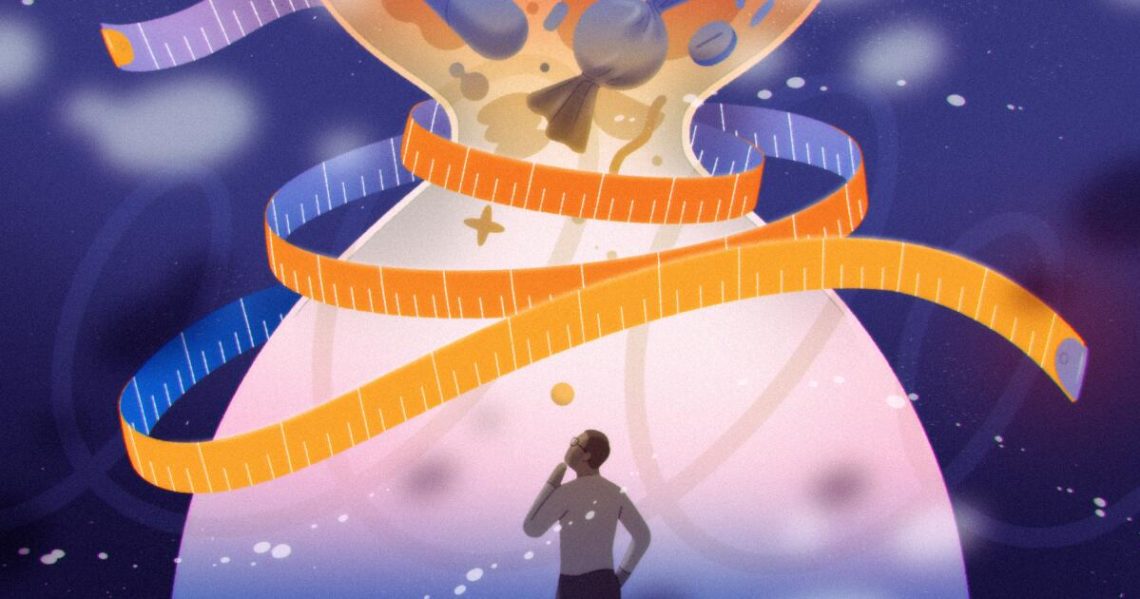Are cookies and chips the new cigarettes? And soda, breakfast cereals and ice cream the new opioids?
In his new book, “Diet, Drugs, and Dopamine: The New Science of Achieving a Healthy Weight” (Flatiron Books), former FDA Commissioner David A. Kessler argues that ultraprocessed foods — meaning “irresistible, highly processed, highly palatable, energy-dense, high-glycemic foods,” as he describes them — have been purposefully engineered by Big Food to be addictive. He calls them “ultraformulated” instead of “ultraprocessed” so as to highlight the deliberate intent on the part of food manufacturers. As a result, 41.9% of adults in the U.S. struggle with obesity, he says. And by 2030, he projects about half of us will.
It’s a “health catastrophe,” Kessler says, “that has reached its apex on every level.”
Toxic or visceral fat — meaning fat around our internal organs — has led to a rise in diseases and conditions such as Type 2 diabetes, arthritis, blood clots, hypertension, cardiovascular disease, dementia, stroke and certain cancers.
GLP-1 weight loss drugs, such as Wegovy and Zepbound, have helped millions of people shed weight and curb food cravings. But they create additional health problems, Kessler says, and there’s not enough scientific data accrued yet to speak to their efficacy or safety, long-term.
It’s a topic Kessler is intimately familiar with. He’s battled food addiction since childhood, growing up in New York, and his addiction ballooned in college and medical school when sub sandwiches and chicken wings were his rewards for studying hard. He’s since struggled with managing the side effects of GLP-1 drugs. To reverse the obesity crisis, says Kessler, we need to better understand addiction itself: how ultraprocessed foods take hold of our rational brain. We must also create a new paradigm for addiction, Kessler says, as the current one views addicts through the lens of weakness.
In his book, Kessler urges us to recognize that obesity is a chronic condition that needs to be treated as such.
The Times spoke with Kessler about healthy weight loss strategies for the long-term, guidelines for using GLP-1s safely, the body positivity movement and improving lifespan.
This interview has been condensed and edited for clarity.
In the book, you talk about “the elephant in the room” when it comes to struggles around weight loss today. What is it?
We’ve failed to recognize how difficult it is to escape the pull of food addiction and overcome our brain’s built-in reward response to these ultraformulated foods that flood our food supply. I’m not talking about cocaine or amphetamines that excessively hijack the dopamine circuits. But the addictive circuits are part of all of us. We are all wired to focus on the most salient stimuli in our environment. And for many of us, that stimuli are these ultraformulated foods. Food is very, very powerful in changing how we feel. It’s not a question of willpower. Our bodies have experienced an insidious decline over the past half a century. And that’s been caused by this never-ending consumption of foods that can trigger the addictive circuits.
How can we “quiet the noise,” as you say, around food addiction?
It’s the interaction between the stimuli in our environment and our brains. Change our environment, and we can remarkably change what’s going on in our brains. [Environment] is everything outside our bodies that we interact with, from the moment we wake up to the moment we go to sleep. What you put on your TV, what fast food restaurants you pass by on the way to work, we are constantly being cued. So you try to eliminate the cues. Or change your environment. Many of us don’t have the opportunity to leave our environment. And the food industry isn’t prone to change their behavior any time soon. But we now have pharmaceutical aids to help tamp that down. The effect of these GLP-1 [weight loss] drugs on food noise, that’s the big discovery.
GLP-1 drugs can lead to serious medical conditions that concern you. What are they, and what should doctors and drug companies be doing differently?
The fact is that the only way you’re going to lose weight — whether it’s drugs or diet or surgery — is to have an energy deficit. [GLP-1s] are very effective at getting you to consume less. But some people are eating less than 1,000 calories a day. There are people eating 600, 800 calories. You have to be under medical care or you run the risk of malnutrition. Food stays in your gut longer and that delay in gastric entering [called gastroparesis] can cause its own set of symptoms as well as metabolic consequences such as hypoglycemia, low blood sugar and other metabolic states. They all result from malnutrition.
Many doctors who are prescribing this are not well-trained in obesity medicine or in nutrition. And it’s very important, if possible, that a team of healthcare professionals, including a dietitian, be available. There’s no doubt that [drug companies] need to do a better job of studying the real world data. How to use these drugs, how to safely get off these drugs, is a key issue. There needs to be better labeling surrounding gastroparesis and the risks associated with these drugs.
Most people aren’t going to be on GLP-1s for life because they’re expensive and have adverse effects, you say. Yet going off the drugs, most people gain back the weight. So what’s the solution, long-term?
The question is about intermittent use — can I use these drugs to get my weight off? Then can I use them, intermittently, over a lifetime? But we don’t have data yet to know [if] that’s safe. But you can use these drugs to condition yourself to learn how to eat differently. I eat very differently now — I don’t want to put large amounts of food in my stomach. I’ve conditioned myself not to do that. How long that will last, we’ll see. So you need a range of tools. That can range from nutrition therapy to behavioral therapy to physical activity — and they’re going to vary for the individual. There’s no one tool that’s gonna work for the duration. The pharmacological tools are only one tool, it’s the entire tool box that has to be available. But the most important thing is to recognize that this is a chronic condition that needs continuous care, even after you’ve lost the weight.
Achieving a healthy body weight starts with understanding addiction, you say, not necessarily the old advice to “eat less and move more.” Why is this so important?
The ultimate answer is ‘eat less and move more.’ But we can’t do that because of the physiological and addictive circuits — they stand in the way. We have to understand that addiction is not just about the weak and the downtrodden. It’s part of all of us, those circuits. We can’t overestimate the amount of stigma and shame and distress that many feel because they’ve been unable to control their weight. They feel it’s their fault, they don’t like themselves for it and society has created all these biases attached to it. The simple recognition [that] our brains are not fully under our control when it comes to these energy dense foods is a very important step.
There’s a delicate balance between the body positivity movement, which encourages people to accept their bodies as they are, and the health crisis that is obesity, which you say is a root cause of many diseases. How do you suggest we navigate that?
That movement did a lot of good — it took the shame out of it, it took the stigma out. But it was at a time when we didn’t have effective tools to reduce visceral fat. You can love your body, but also do things for your health. Those things are not diametrically opposite. And I’m not comfortable with the amount of morbidity and mortality associated with visceral fat and saying we shouldn’t do something about that.
As former commissioner of the FDA, what keeps you up at night these days?
The recognition that visceral fat is causal in an array of cardiometabolic diseases that increase real disability in one’s senior years. I think we’re not prepared to handle that. We’ve only woken up to the fact of how toxic this visceral fat is.
[Also], Trump’s greatest achievement, in the first term, was Operation Warp Speed. And I was part of it beginning January 2021. The reason we were able to do what we did, and get those vaccines safely developed and produced and distributed, was because there existed institutions within our federal government: the [National Institutes of Health], the [U.S. Food and Drug Administration], the [Center for the Biomedical Advanced Research and Development Authority], the [Centers for Disease Control and Prevention]. Those institutions had enormous expertise and resources. And yes, we had to put it together; yes, we had to do things differently. But we were able to build on that infrastructure. Now they’re destroying that infrastructure. I don’t get it.
To end on a positive note: What amount of weight loss actually decreases future risk of disease?
What’s remarkable is that relatively small amounts can have significant effects. If you want to reverse certain conditions, that would require more weight loss. But almost any weight loss is going to add clinical benefits and be useful in reducing cardiometabolic risk.
The post You need more than Ozempic to fight food addiction. Here’s how appeared first on Los Angeles Times.




